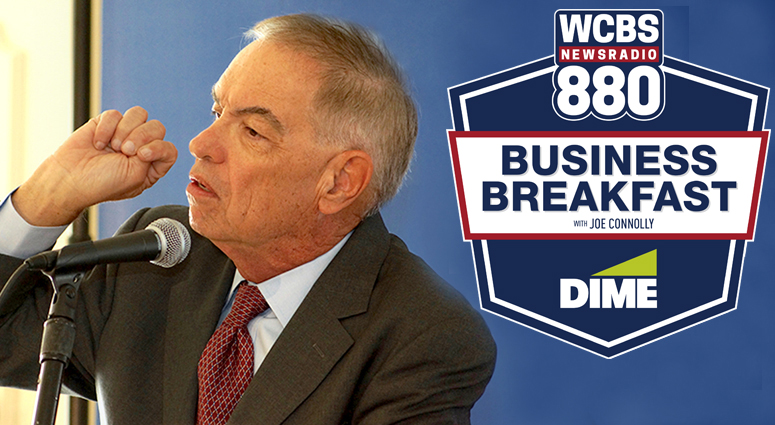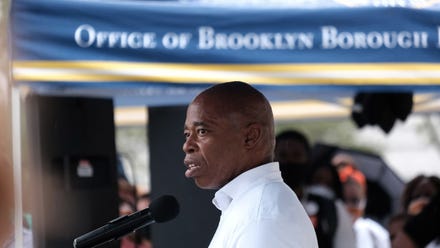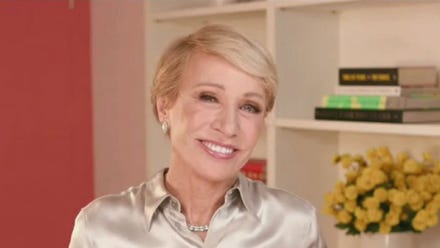
Neil A. Carousso produces NewsNation original “Kurt’s Country” – a celebration of country music and a slice of Americana with host Kurt Bardella.
-
Back to Office Exposes Digital Divide between Employers and Employees
Post Views: 546By Joe Connolly and Neil A. Carousso
CONNECTICUT (WCBS 880) — At about 7:30 a.m. on a weekday morning in October, David Lewis is driving to OperationsInc headquarters in Norwalk, CT. He can spot plenty of good parking spaces available at the New Canaan train station.
“You could have found a parking spot up against the train station tracks, themselves, which were coveted spaces that used to fill at 5/5:30 in the morning. That tells me all I need to know about how people still are working remotely and are not making their way into the city,” said Lewis on the WCBS Small Business Spotlight, sponsored by Dime Community Bank.
That’s concerning to the human resources CEO who feels the same way as many of his larger clients: They want workers back in the office.
“I’m ecstatic about the ability to dynamically talk to my employees, bring somebody into a meeting, and have a quick conversation with them about an issue that just came up,” Lewis told Joe Connolly and Neil A. Carousso. “I keep hearing that from our clients that ‘I want to go back to the way that we did it before because that worked best for us.'”
He recognizes, though, that remote work has increased productivity in many areas. One glaring outlier is employee training.
“Training for us was always about the in-person experience – about coming into a training facility, a training room, or a hotel conference center – and being able to get in front of our students and really connect with them – have a discussion versus have a lecture. That’s our secret sauce. But, we’ve had to pivot that since last year to something online,” said Lewis.
To combat so-called “Zoom fatigue,” OperationsInc has made its online training modules shorter. Lewis also admits the world has changed.
“Employees are in control and employers need to understand that,” he said.
Many workers want the flexibility that remote work allows, namely flexible work hours, absence of a commute, and the ability to pick up their kids from school.
Lewis tells his clients to find the right balance or turnover will be extremely high.
Labor issues continue to plague businesses and many prospective employees complain that their online application does not get noticed by a human resources professional.
Lewis told Connolly and Carousso that artificial intelligence has exacerbated a huge problem during the pandemic .
“A lot of companies have invested a lot of money in these applicant tracking systems but don’t know enough about how to change these filtration settings to get the candidates that they’re looking for through the door,” he said.
“They also tend to eliminate a lot of people because they’re not remembering that the settings they have – five years of this or two years of that – have to be regularly adjusted.”Lewis told WCBS 880 another hiring issue at play is that in-person jobs are not as desirable as remote work in the current labor market.
Watch the WCBS Small Business Spotlight video above for more on this story.
-
Why Inoculating Kids is the Key to Driving Down U.S. COVID-19 Infections
Post Views: 567Produced by Neil A. Carousso
NEW YORK (WCBS 880) — Pfizer’s COVID-19 vaccine could be approved for children as soon as next week after the company’s data showed its kid-sized dose is nearly 91 percent effective in preventing symptomatic infections.
https://omny.fm/shows/880-weekly-rewind/why-inoculating-kids-is-the-key-to-driving-down-uOn this week’s 880 Weekly Rewind, Lynda Lopez covers the latest developments in the pandemic fight and looks at ways to improve healthcare in communities of color.
Subscribe to The 880 Weekly Rewind podcast for in-depth reporting and deeper analysis of the top stories of the week, produced by Neil A. Carousso, for WCBS-AM New York.
-
Fall 2021 WCBS Virtual Business Breakfast: Building Back Stronger
Post Views: 766Presented by Dime Community Bank
By Joe Connolly and Neil A. Carousso
NEW YORK (WCBS 880) — Businesses continue to face unprecedented challenges from labor to supply shortages, but the COVID-19 pandemic has also created opportunities in crowded markets. There was a sense of optimism and hope for small businesses on the WCBS Virtual Business Breakfast, presented by Dime Community Bank.
“We saw people grow sometimes as big as 13-times over because they moved from wholesale to direct-to-consumer,” Shopify’s Head of Spaces Cody DeBacker told host Joe Connolly.
By selling direct-to-consumer, businesses grew their margins and Shopify’s e-commerce tools assisted wholesalers and brick-and-mortar retailers in making a successful pivot to digital. It has opened a new revenue stream for many businesses.
“We believe that anyone in the world can become an entrepreneur with the right tools and we want to put those into the hands of the right people,” said DeBacker.
Shopify, which started in 2004 as a snowboard company called Snowdevil before realizing the greater opportunity to provide e-commerce solutions to businesses, recently opened an entrepreneurial space in SoHo where they provide one-on-one business coaching and house full-scale photo and podcast studios. You will get an inside look at Shopify NY on the WCBS Virtual Business Breakfast.
FINDING NEW OPPORTUNITIES
A theme that emerged on the program was “opportunity.” Leading startup investor Kevin P. Ryan, founder and CEO of AlleyCorp, notes that opportunity exists whether an industry is thriving or suffering.
“What I ask everyone to think about is: ‘What is expensive in your life or in your business?’ ‘What’s hard to get?’ ‘What has poor service?’ and those are things where someone can do it better. Almost all ideas come out of that problem,” Ryan said.
The Internet entrepreneur pointed to Harry’s and Dollar Shave Club’s disruption of the personal care products industry as an example of the market shifts that are taking shape due to the pandemic.
“Both Dollar Shave Club and Harry’s are both billion dollar companies just going after that one small sub-sector,” Ryan explained, adding, “You’re going to see other examples of that that are occurring in deodorant, that are occurring in skincare, in suntan lotion – across the board. No area is off touch to entrepreneurs now.”
He told Connolly it was previously unheard of for a small business to try to breakthrough in such a crowded market, but leaner businesses actually have an advantage.
“When you’re a startup, you want to be competing with very large companies, which sounds the opposite of what you would think. But, it’s always more dangerous to be competing with a small, scrappy startup that’s moving very quickly that’s getting very good people,” he said. “Large companies have 50 different priorities; they don’t get to it.”
LEAN AND MEAN
Zola, the online wedding registry, gained market share by filling a void within a crowded field. Ryan founded Zola through his firm AlleyCorp when he saw large department stores had very limited wedding registries.
“You had to offer plates and glasses and forks and things like that, which made sense when the bride and groom were 22 in 1960 and they’re moving into their first apartment. But now, a lot of people had been living together. They’re 32 years old. They already have some plates and knives and forks,” he said.
Zola separated themselves from the department stories by offering cash gifts and experiences like Knicks tickets. When stores like Macy’s and Bloomingdale’s caught on, Zola introduced adjacent services like online invitations and full-service wedding planning. Ryan said their larger competitors couldn’t keep up.
DIGITAL SUCCESS STORY
Connolly invited the founder of another business Ryan invested in on the WCBS Virtual Business Breakfast. Marc-Kwesi Farrell launched Ten To One Rum in 2019 after nearly three years as the youngest vice president at Starbucks where he worked under former chairman and CEO Howard Schultz who has since become Farrell’s friend and mentor.
The original plan for the Trinidadian-born entrepreneur was to make it in traditional retail with a new, premium rum brand. But, the pandemic forced him to explore a direct-to-consumer business model and begin marketing his product differently. That’s when Farrell realized that his story was leading to sales as much as the quality of his product.
“Our business is not just a story of creating another premium rum brand, it’s actually also finding a way to offer a more unique point-of-view on the culture – Caribbean culture, actually – that surrounds the business and the brand,” he told the WCBS Virtual Business Breakfast. “The passion and the purpose that surround it certainly seems to be a message that has resonated.”
Ten To One Rum hosts events and experiences around its brand while boasting more than 12,400 followers on Instagram. Farrell recently brought in singer and songwriter Ciara as an investor, co-owner and director.
“These are the success stories,” DeBacker beamed.
“They want to see the real you. They don’t just want a product. They want to be a part of your story, they want to be a part of your brand,” the Shopify executive said of successful digital marketing content. “It’s about creating a meaningful story that they can get behind.”
See winning sales and marketing strategies on the free WCBS Virtual Business Breakfast, presented by Dime Community Bank above.
MEET OUR EXPERTS:
Kevin P. Ryan
CEO and Founder, AlleyCorp
Photo Credit: Kevin P. Ryan Kevin P. Ryan is one of the foremost Internet entrepreneurs in New York, having founded and is Chairman of several businesses, including AlleyCorp, Zola and Nomad Health. Previously he founded and was Chairman of MongoDB, Business Insider and GILT. Combined, these companies have raised more than $700 million in venture capital funding and currently employ almost 2,000 people. Previously, Kevin helped build DoubleClick from 1996 to 2005, first as President and later as CEO. He led DoubleClick’s growth from a 20-person startup to a publicly traded global leader with over 1,500 employees. In 2013, Kevin was named one of “The 100 Most Influential New Yorkers of the Past 25 Years” by the Observer.
Aside from his professional responsibilities, Kevin serves on the board of Mercy Corps, is Vice Chairman of The Partnership for New York City, is a member of the CFR Committee on Foreign Affairs, is on the Board of TECH:NYC and is Director Emeritus for Human Right Watch. He previously served on the boards of Yale Corporation, INSEAD, the Direct Marketing Association, The Ad Council, HotJobs and the advisory board of Doctors Without Borders. He holds a B.A. from Yale University and an M.B.A. from INSEAD graduate business school.
Cody DeBacker
Head of Spaces, Shopify
Photo Credit: Cody DeBacker Cody DeBacker is the Head of Shopify Spaces. His projects and experiential activations have landed coverage in Forbes, The New York Times, Hypebeast, Complex, and hundreds of other publications around the world.
Cody’s current role is focused on leading Shopify’s physical spaces, and most recently, his team opened the first ever Shopify entrepreneurial community space in New York that features free one-on-one business support, commerce training workshops, and thought provoking panels and events with the industry’s top entrepreneurs and merchants.
He has also lead a team that participated in consumer conventions around the world such as Star Wars Celebration, NYCC, Complexcon, Hypefest, Family Style, and more. Cody is also the owner of 143 Worldwide, a DJ, and has been working in the fashion, trade show, and tech space for more than a decade.
Marc-Kwesi Farrell
Founder of Ten To One Rum
Photo Credit: Ten To One Rum Marc-Kwesi Farrell launched Ten To One Rum in 2019 after nearly three years as the youngest vice president at Starbucks. Ten To One Rum hosts events and experiences around its brand while boasting more than 12,400 followers on Instagram. Farrell recently brought in singer and songwriter Ciara as an investor, co-owner and director.
-
AUDIO: Adams would mandate COVID vaccine for NYC schoolkids if FDA approves shot
Post Views: 676By Lynda Lopez
Produced by Neil A. Carousso
NEW YORK (WCBS 880) — Democratic nominee for New York City Mayor Eric Adams on Friday said he would issue a vaccine mandate for all public school students if the shot is approved by the U.S. Food and Drug Administration.
In an interview with WCBS 880’s Lynda Lopez, the mayoral hopeful said that vaccine mandates are nothing new for the United States, and he believes that they are necessary to ensure the health and safety of all New Yorkers.
https://omny.fm/shows/880-weekly-rewind/eric-adams-would-mandate-covid-vaccines-in-schools“This is a city and country where we do vaccinate. I was vaccinated for smallpox, for mumps, measles and so many others. We already have a system in place that states before you start school, you receive your vaccination,” Adams said. “It is to protect the child and the student population. We saw, historically, what happens when you have an outbreak of a certain type of illness that we can prevent … so I say yes, if it is FDA approved, we should also mandate it, as we mandate with other vaccinations.”
His comments came just hours after current Mayor Bill de Blasio stood by his decision not to require COVID vaccinations for school kids once they’re approved for children under 11.
“The issue that’s been raised so many times is, should there be a mandate for a child to be able to go to our schools. And I feel very strongly, our health care team feels strongly, our Chancellor Meisha Ross Porter feels very strongly our kids need to be in school,” de Blasio told WNYC on Friday. “So, I’ve said I’m not ready, nor is the Chancellor to exclude children who are unvaccinated because their parent won’t let them be vaccinated. That’s the reality. The child doesn’t get to decide, the parents have to give consent.”

Democratic mayoral candidate Eric Adams at a rally in Brooklyn on Sept. 9, 2021. (Photo credit: Spencer Platt/Getty Images) The mayor noted that 75% of teenagers in the city are vaccinated and believes younger children “will be even a higher percentage ultimately.”
“But I’m not going to, certainly not at this point, I’m not going to say a child can’t come to school if they’re unvaccinated because they’ve been excluded from education for too long,” he added.
In his interview, Adams also said that he would sit down with NYPD and FDNY union leaders to issue a vaccine mandate for both departments, as well as schools.
“I believe there’s a way to work this out where we all will see the importance of having our first line workers being vaccinated,” he said.
Meanwhile, the Democratic nominee talked about the city’s Gifted and Talented program for kindergartners – which Mayor de Blasio has planned to do away with – saying he would like to preserve the program, but restructure it to make it more accessible to all New Yorkers.
“I have been extremely vociferous around the expansion of programs for accelerated learners,” he said. “I believe that we should have students opt out of the tests and not have to navigate the process to sign up for the tests. And we should not only test at 4-years-old but throughout the educational system. It is wrong and it is unfair to test the child at 4, and it will determine their entire educational career.”
Subscribe and download The 880 Weekly Rewind podcast for in-depth reporting and deeper analysis of the top stories of the week, produced by Neil A. Carousso, for WCBS-AM New York.
-
VIDEO: Why Barbara Corcoran Believes Best Investments are in People
Post Views: 902By Joe Connolly and Neil A. Carousso
NEW YORK (WCBS 880) — Barbara Corcoran, the self-made “queen of New York real estate,” has always put her customers and her workers, first. That mantra is guiding her businesses out of the COVID-19 pandemic.
“I don’t buy businesses. I buy people,” Corcoran told Joe Connolly and Neil A. Carousso on the latest WCBS Small Business Spotlight, sponsored by Dime Community Bank.
“The reason I was able to build such a large company is because I adored my employees and would do anything for them at any time – anything for them – they came first,” she said. “You have to have that attitude toward employees if you want to do well with them.”
A tight labor market has left many job postings unfilled. The “Shark Tank” star said the businesses that have survived the pandemic are growing, but their biggest challenge is hiring and retaining workers.
“It’s not just at your local restaurants, it’s at your dry cleaners, it’s at your technology companies. Everyone across the board is having a hard time attracting employees,” she said.
Corcoran noted one way to limit turnover is to pay more competitive salaries. She explained many customers are willing to support small businesses in their communities.
“They’re very amiable to helping small businesses if they think they’re helping a good business get ahead. So, you can pass on a lot of those costs, but you have to pay people more,” said Corcoran.

Barbara Corcoran listens to a pitch on ABC’s “Shark Tank.” (Photo Credit: ABC) She told WCBS 880 businesses must be more flexible with remote work, too.
“You have to give them the latitude and the freedom to work different hours, which now, people have been spoiled by because of COVID. Anybody who’s dictating that you must be here 9 to 5, come every day of the week, is not getting the employees because employees have other choices. They just move on and get a better boss so you have to be a phenomenally good boss and do everything you can to help that employee and that’s how you get them,” Corcoran said.
She describes “good bosses” as those who put the needs of their customers and employees before their own. She believes that’s the primary reason that The Corcoran Group blossomed into a $5 billion company when she sold it in 2001.
Corcoran called companies that are still not embracing remote work “stupid.”
“If you’re not budging, you’re stupid because you’re not doing what is the basic, core essence of all business: it’s called change,” she said, noting the seismic shifts businesses have been forced to adapt to over the past 19 months. “Let me tell you, if you don’t acknowledge the change that happens, you don’t stay in business.”
The famous entrepreneur said on the WCBS Small Business Spotlight that the job of the business owner is to spot trends early and direct their team “on which ways to run.” That’s how, she said, small businesses become big businesses.
“You know, the great advantage I saw early in my business when I looked around and saw my big competitors was I picked up on their attitude. They were big shots. The minute I saw everyone playing ‘big shot,’ I knew I had a shot,” said Corcoran, adding, “Most big businesses think they’re competing with other big businesses. They’re not. That’s not the enemy. The enemy is the little business that’s going to come up from behind and bite you in the butt.”
She said she tells companies like Ernst & Young in corporate speeches to think small. As for small businesses, Corcoran advises to learn everything about operating the business; those that are hungry will win the race.
Corcoran turned a $1,000 loan from a boyfriend in 1973 into a multi-billion dollar real estate empire. She told Connolly and Carousso that she budgeted every cent and hustled for every sale to keep her little business alive in the early days. That’s what she’s seeing new entrepreneurs doing today in season 13 of ABC’s “Shark Tank.”
“So many of the entrepreneurs that were standing before us either got fired or left their job,” Corcoran said. “They had part-time things they liked to do and they just decided they had time to think about it. They weren’t happy with their life and that was the time to make a big change and they took their part-time gig and they made it a full-time business. And, ironically, those were the strongest businesses we saw.”
See what it takes to make your dreams a reality on the WCBS Small Business Spotlight featuring Barbara Corcoran above.











